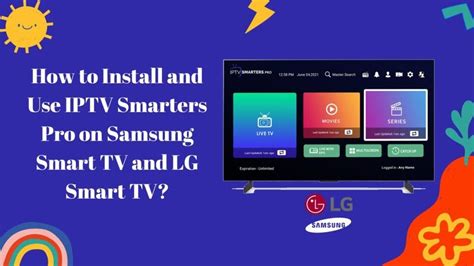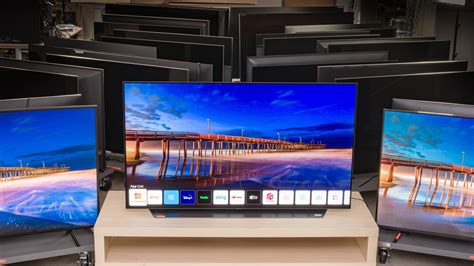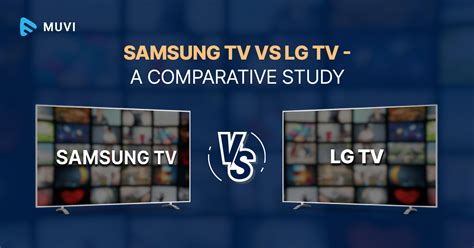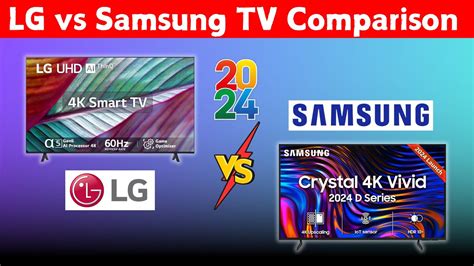When it comes to choosing between LG and Samsung TVs, consumers are often faced with a daunting decision. Both brands have been at the forefront of the television industry for years, offering a wide range of models with cutting-edge features and technologies. In this article, we will delve into the world of LG and Samsung TVs, exploring their unique characteristics, strengths, and weaknesses to help you make an informed decision.
Display Technology: A Key Differentiator

One of the primary factors to consider when choosing between LG and Samsung TVs is the display technology used. LG is renowned for its OLED (Organic Light-Emitting Diode) panels, which are widely regarded as the gold standard in terms of picture quality. OLED technology offers unparalleled contrast, color accuracy, and viewing angles, making it ideal for cinematic experiences. On the other hand, Samsung has traditionally relied on QLED (Quantum Dot Light Emitting Diode) technology, which, while excellent in its own right, falls slightly short of OLED in terms of contrast and black levels. However, Samsung’s QLED TVs have made significant strides in recent years, offering improved color volume and brightness.
OLED vs. QLED: A Comparison
To better understand the differences between OLED and QLED, let’s examine some key metrics. OLED panels have a contrast ratio of approximately 1,000,000:1, whereas QLED panels typically have a contrast ratio of around 10,000:1. This means that OLED TVs can produce true blacks, resulting in a more immersive viewing experience. Additionally, OLED panels tend to have a wider color gamut, covering around 99% of the DCI-P3 color space, compared to QLED’s 95%. However, QLED TVs often have higher peak brightness levels, making them more suitable for very bright environments.
| Display Technology | Contrast Ratio | Color Gamut | Peak Brightness |
|---|---|---|---|
| OLED | 1,000,000:1 | 99% DCI-P3 | 1,000 nits |
| QLED | 10,000:1 | 95% DCI-P3 | 1,500 nits |

Smart TV Platforms: A Comparison

Another important consideration when choosing between LG and Samsung TVs is the smart TV platform used. LG’s webOS is widely regarded as one of the most user-friendly and intuitive platforms available, offering a seamless navigation experience and a wide range of apps. Samsung’s Tizen, on the other hand, has improved significantly in recent years, offering a more streamlined interface and better app support. However, some users may find Tizen to be slightly more cluttered and less responsive than webOS.
Smart TV Features: A Key Consideration
In addition to the smart TV platform, both LG and Samsung offer a range of innovative features that can enhance the viewing experience. LG’s ThinQ AI technology, for example, allows for personalized recommendations and seamless control of other smart devices in the home. Samsung’s Bixby, on the other hand, offers a more comprehensive voice assistant experience, allowing users to control their TV and other smart devices with ease.
Key Points
- LG's OLED technology offers unparalleled picture quality and contrast
- Samsung's QLED technology offers improved color volume and brightness
- LG's webOS is a more user-friendly and intuitive smart TV platform
- Samsung's Tizen has improved significantly in recent years
- Both brands offer innovative features like AI-powered recommendations and voice assistants
In conclusion, the choice between LG and Samsung TVs ultimately depends on your individual needs and preferences. If picture quality is your top priority, LG's OLED technology is the clear winner. However, if you prioritize brightness and color volume, Samsung's QLED technology may be the better choice. Regardless of which brand you choose, it's essential to consider factors like smart TV platforms, innovative features, and price to ensure that you find the perfect TV for your needs.
What is the main difference between OLED and QLED technology?
+The main difference between OLED and QLED technology is the way they produce light. OLED panels use an emissive technology, where each pixel emits its own light, resulting in true blacks and infinite contrast. QLED panels, on the other hand, use a transmissive technology, where a backlight is used to illuminate a layer of quantum dots, resulting in lower contrast and black levels.
Which smart TV platform is more user-friendly, webOS or Tizen?
+LG’s webOS is widely regarded as one of the most user-friendly and intuitive smart TV platforms available, offering a seamless navigation experience and a wide range of apps. Samsung’s Tizen, on the other hand, has improved significantly in recent years, but some users may find it to be slightly more cluttered and less responsive than webOS.
What is the difference between LG’s ThinQ AI and Samsung’s Bixby?
+LG’s ThinQ AI technology allows for personalized recommendations and seamless control of other smart devices in the home. Samsung’s Bixby, on the other hand, offers a more comprehensive voice assistant experience, allowing users to control their TV and other smart devices with ease.



